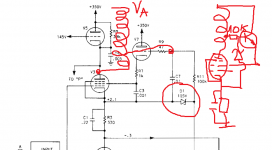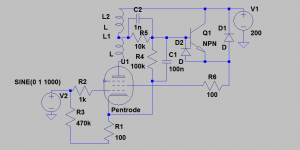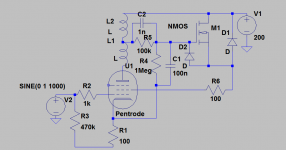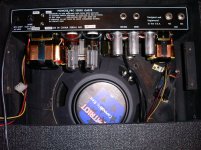I wonder if I can put a zener diode between the pentode's screen grid and the UL tap of the OT to lower the screen grid voltage?
e.g.: My B+ voltage is 460V, and I want the g2 voltage to be 350V. Then I connect the g2, a 110V zener diode and the UL tap in series.
If I can do so, how large the dissipated power will the zener handle? Can a 3W zener diode be used in here? What I should concern is only the maximum current of the screen grid, isn't it?
e.g.: My B+ voltage is 460V, and I want the g2 voltage to be 350V. Then I connect the g2, a 110V zener diode and the UL tap in series.
If I can do so, how large the dissipated power will the zener handle? Can a 3W zener diode be used in here? What I should concern is only the maximum current of the screen grid, isn't it?
Am no expert but wouldn't have thought so as the zener going to turn off and on as V changes on G2 therefore no smooth transition.
Andy.
Andy.
Am no expert but wouldn't have thought so as the zener going to turn off and on as V changes on G2 therefore no smooth transition.
Andy.
Oh, that's true. I ignore this problem. It seems that the zener will rectify the AC signal, which is bad for the negative feedback of the screen grid.
here's an ultralinear tektronix scope stage modified for your needs, but this way you loose the linearity itself so something better would be to use a resistor divider in the base of a transistor.l2dc resistance is much lower than R5 so the resistor divider will set the real dc level while ac levels should be the same.it's just that now the screen tap impedance is much higher and you might need a different tap ratio for the best UL THD.
Attachments
Last edited:
here's an ultralinear tektronix scope stage modified for your needs, but this way you loose the linearity itself so something better would be to use a resistor divider in the base of a transistor.l2dc resistance is much lower than R5 so the resistor divider will set the real dc level while ac levels should be the same.it's just that now the screen tap impedance is much higher and you might need a different tap ratio for the best UL THD.
thanks
Why do you need the lower g2 voltage? Surely if the plate voltage is OK the g2 voltage as divided by the UL tap is also correct? Or at least acceptable?
Why do you need the lower g2 voltage? Surely if the plate voltage is OK the g2 voltage as divided by the UL tap is also correct? Or at least acceptable?
Some tubes bought from the local market can't handle a high g2 voltage, such as some Chinese KT88s. They will have a big chance to blow up if the g2 voltage is higher than 420V. (This is what a local tube seller told me.) Some beam tetrodes like FU-7(Chinese version of 807) , 6P3P(Chinese/Russian version of 6L6G) are much cheaper than the russian 6L6GC in the local market. But if you use them in UL connection, you should pay attention to the g2 voltage because they will more easily fail with the g2 voltage over 400V.
I’m not sure this is a good idea. Remember that a zener only gives its nominal voltage drop for reverse bias after a certain current threshold, Izt. My 0.02 is that a resistive voltage drop is better, and more congruent with the UL operating mode.
With a Zener, the initial screen voltage will be less than the plate voltage.
Example, a 50V Zener, and the plate is at 350V, the screen is at 300V (well the UL tap is a little higher voltage because of the DCR drop of the windings from the UL tap to the plate tap.
But his will work for some tubes, depends on the tube, see below.
A 40% Ultra Linear Tap will only reduce the screen by 40V, when the plate is reducing by 100V.
Lets say the plate voltage swings down from 350V to 50V, a 300V change.
Then the screen which started at 300V, but will swing down by 0.4 x 300V = 120V
That means the screen will now be at 300V - 120V = 180V.
Screen at 180V, plate at 50V.
Could be a problem for some tubes.
The only way to know is to look at the tube curves: the screen current, versus screen voltage, versus plate voltage.
Example, a 50V Zener, and the plate is at 350V, the screen is at 300V (well the UL tap is a little higher voltage because of the DCR drop of the windings from the UL tap to the plate tap.
But his will work for some tubes, depends on the tube, see below.
A 40% Ultra Linear Tap will only reduce the screen by 40V, when the plate is reducing by 100V.
Lets say the plate voltage swings down from 350V to 50V, a 300V change.
Then the screen which started at 300V, but will swing down by 0.4 x 300V = 120V
That means the screen will now be at 300V - 120V = 180V.
Screen at 180V, plate at 50V.
Could be a problem for some tubes.
The only way to know is to look at the tube curves: the screen current, versus screen voltage, versus plate voltage.
Chinese 6L6's are actually pretty rugged.
I have this Pignose G60 guitar amp for 17 years now, still with its original tubes. My initial plan was to replace them with some American NOS, but the Chinese tubes have been holding up so far, with a nice tone too; they have 450V on the plates and 436V on the screen grid (non-UL).
For a UL connection, you have a number of ways to deal with G2:
I have this Pignose G60 guitar amp for 17 years now, still with its original tubes. My initial plan was to replace them with some American NOS, but the Chinese tubes have been holding up so far, with a nice tone too; they have 450V on the plates and 436V on the screen grid (non-UL).
For a UL connection, you have a number of ways to deal with G2:
- Use the right tube that can take the voltage
- Lower the HT. One nice way to achieve this is to turn the HT filter into a LC by adding a choke. I did this in my amp because it's way too loud.
- Use a special output transformer with a separate G2 winding.
Attachments
I wonder if I can put a zener diode between the pentode's screen grid and the UL tap of the OT to lower the screen grid voltage?
e.g.: My B+ voltage is 460V, and I want the g2 voltage to be 350V. Then I connect the g2, a 110V zener diode and the UL tap in series.
If I can do so, how large the dissipated power will the zener handle? Can a 3W zener diode be used in here? What I should concern is only the maximum current of the screen grid, isn't it?
Yes you can - the screen current and plate current tend to keep a constant ratio. You will need a high value resistor to ground to sink say 2ma as the screen current can go to zero. Obviously the result you will get depends on the valve curves. Note you also increase the sensitivity to HT variation. You will also have alter the bias as the current will drop I think.
- Home
- Amplifiers
- Tubes / Valves
- Can I use a zener diode in g2 in a UL pp amplifier?



